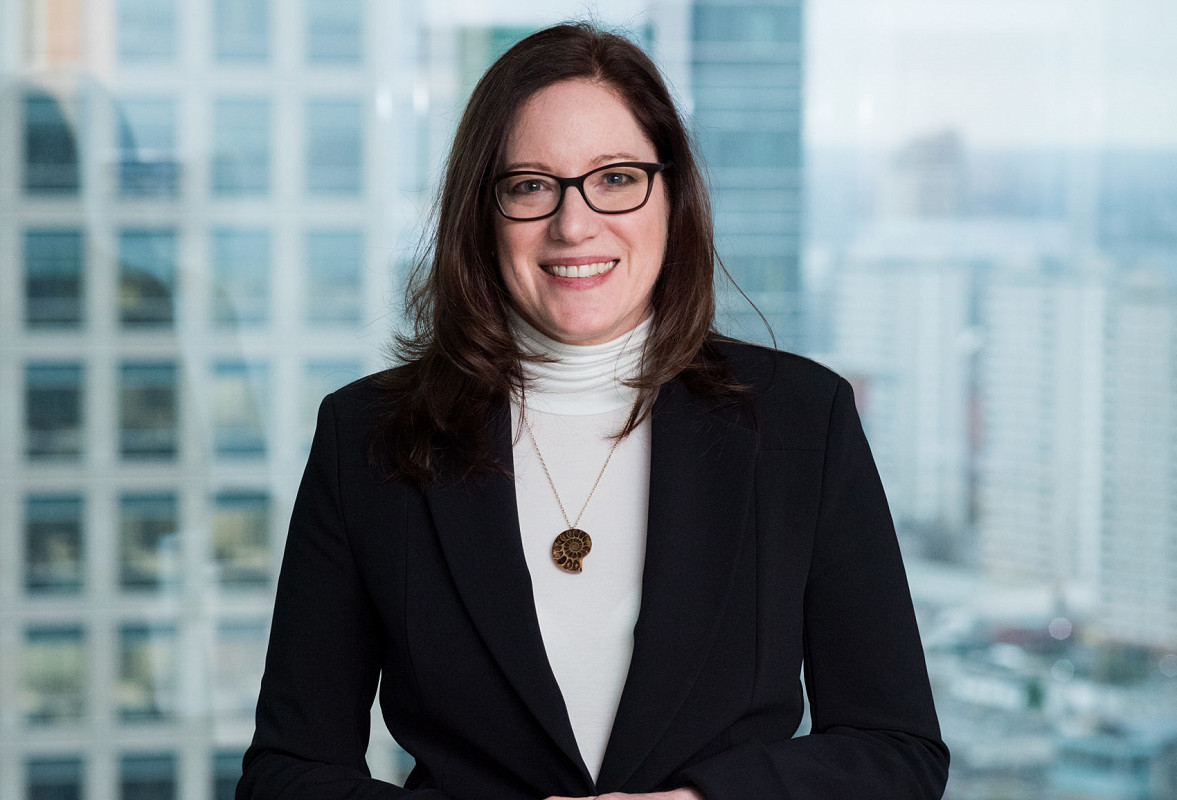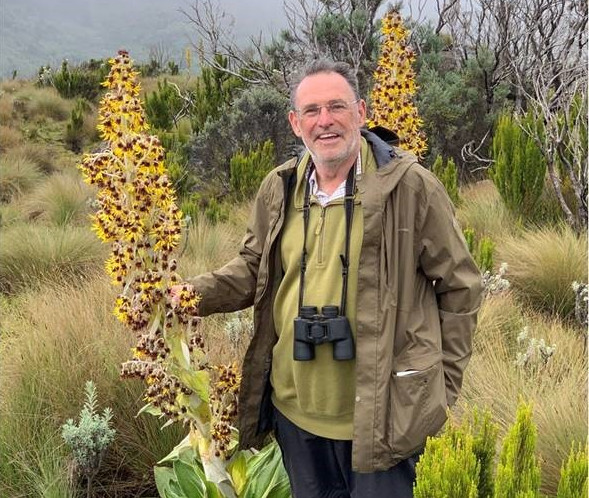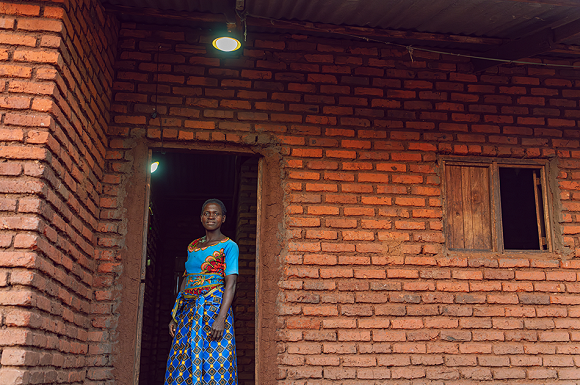24/05/2022
TKT Podcast — CCI Turner Fellow Elree Winnett Seelig & Dr Mike Maunder

In the first episode of the Turner Kirk Trust Podcast, Elree Winnett Seelig, the inaugural Turner Fellow at the Cambridge Conservation Initiative (CCI), sits down with Dr Mike Maunder, the CCI's Executive Director, to discuss her work during the Fellowship, the increasing importance placed on conservation and climate issues by the financial community, as well as wider biodiversity issues facing the planet as a whole.
Elree Winnett Seelig is a Managing Director and Global Head of Environmental, Social and Governance (ESG) for Citi’s Markets business. Dr Mike Maunder is the Executive Director of the Cambridge Conservation Initiative, a unique collaboration between the University of Cambridge and nine leading internationally-focused biodiversity conservation organisations.
In 2020, the Turner Kirk Trust provided a donation to the Cambridge Conservation Initiative to establish the Turner Fellows Programme. The goal of the programme is to foster cross-disciplinary collaboration and to integrate diverse areas of expertise across science, policy and practice.
Dr Mike Maunder: My name is Mike Maunder, I'm Executive Director of the Cambridge Conservation Initiative, that's a network of 10 conservation organisations with the foundation member being the University of Cambridge. And we're based in the David Attenborough Building here at the University of Cambridge, and we're sitting in the artist's studio where our artist in residence would normally be working on interpreting biodiversity data. So, it's a great place for me and Elree to have a chat.
Elree Winnett Seelig: And I'm Elree Winnett Seelig. I'm head of ESG, or environmental, social, and governance for Citi's markets business. I'm also a Turner fellow here at CCI.
Mike: The Turner Fellowship is one of the most important things I think we're doing at the moment here at CCI, because we're based on collaboration at all levels. And we're based on the recognition that while we have 10 fantastic conservation organisations all working together under one roof, we're only part of the matrix that's needed for securing biodiversity and securing species over the future.
So, with the support of Trish and Ewan, and creating this scholarship, we're pleased to have someone from the business community, Elree, to explain this weird, arcane world of terminology that we can't understand and mechanisms that are beyond our comprehension. So, you are the translator-in-general for 500 conservationists.
Elree: Oh, no pressure on that. You know, what's really interesting though, is we talk about arcane language, in the 30 years that I've been working in this space in terms of conservation and finance, the upskilling that has been done by the conservation organisations and the financial community to understand the importance of biodiversity and create that common language has been profound.
I mean, we still might not agree on the values and the value, but we now at least have a common language that we can discuss things.
Mike: I think that's an extraordinary change and we go back a year, 18 months, to Professor Dasgupta's report. And the recognition that so much of global GDP is dependent on nature to a greater or lesser extent.
And then last week we had the United Nations Convention to Combat Desertification study, again, on the huge amount of GDP globally that is at risk because of soil erosion. And I don't remember any other time in my career where you've got a convergence of bankers and financiers and conservationists and community groups and indigenous peoples all asking the same questions: how do we make it better?
Elree: Yeah. You know, I think what's really interesting is the financial community has sort of widened that aperture from climate. And we've talked about the fact that climate isn't easy, but it's a bit easier because we have a common target, one and a half degrees, and we have a common metric, greenhouse gas emissions.
Biodiversity is a bit more complex. Even the attribution of responsibility is complex. But I think there's an awareness of the importance of biodiversity and natural capital and ecosystem services that we haven't had in the past. And there's a level of accountability that the financial community is asking of corporates and the activities.
And there's an interesting collaboration because I think this is one of those times where we know that we don't have all of the information that we need. And we will need to work with the academics, the NGOs, the policymakers to help us do the right thing.
Mike: Yes. As you say, it's that tracking back the product and the supply chain and the responsibilities back to a pixel, back to a point on the planet where there's this rub between business and biodiversity. And, you know, we were working towards a sort of regenerative vision where that could be a positive interaction, but we know that at the moment, a lot of business is extractive and fundamental assets like soil, like pollinating insects, like flood defences, like carbon storage and forest, is all eroding.
So, we talked about this need to move from a traditional business as usual, to one that in recognises that nature is both an asset for business and it is a high risk. And if we can manage that risk and restore those assets, we were going somewhere to future-proofing society.
I think, talking on behalf of colleagues within CCI, having you in the building, talking to so many people and being a very quiet mentor and a quiet translator has given people the confidence to move into these discussions and say, “Well, yes, actually I can see where I fit into this big global dynamic discussion about business and nature, and the next 50, 100, let's push the boat out, 150 years.” So I think that's been a big part of what Trish and Ewan we're looking at is the breaking down of the barriers and there's less pigeonholing.
Elree: Yeah. And the confidence in being able to engage, but also admit what we don't know. How do we solve things together? Coming from the financial community, we've had something very similar in terms of being one of the translators and talking about best practices, talking about how do we get money to conservation? What should we be concerned about going back to your supply chain?
Mike, one of the things that is really interesting when we bring biodiversity into the conversation with our clients, whether they're corporates or public sector or, the investment community, is a recognition about natural capital and the importance of biodiversity, but not really understanding exactly what it is and how important it is. And you guys gave us some stats on GDP that is vulnerable to it, but why is it at risk? What is happening? And what are we talking about when we talk about biodiversity?

Mike: Biodiversity is a really awkward term, biological diversity squashed into biodiversity. The joke of course is you've taken out the logical. There was a famous study done a few years ago where people are asked, what is biodiversity in your thought? It was washing powder. So biodiversity for us pedants in the science community is the totality of all living things. It's so you could define it by list of all the species, let's say the 8 million recorded species.
But it's not just that shopping list of species. It's their interactions. It's the genetic diversity within those species. So you can see that when you go into the supermarket and look at different potato varieties, different colours, different shapes, one for chips, one for boiling, one for mash, that's biodiversity.
And then, of course, we're part of biodiversity and we interact with those species and there's a cultural value to biodiversity. That's pretty abstract. But then you start saying, well, you dress in cotton, you dress in silk, you eat breakfast cereal, you drink coffee. You inhabit a building made of wood, you're depending on a forest to protect your city from flooding. You're depending on a living entity called soil to keep wheat crops and the prairie land secure. So biodiversity permeates all of life.
And some of it we know because we watch it on a Sir David Attenborough documentary, and it has an iconic, almost sort of sacred value, but for the large proportion of the planet biodiversity is: What fire are you using today? What medicinal plant have you harvested and where will the cows find grass? So that is our vision of biodiversity, it's pretty all-encompassing, and it certainly can't be measured by the ton, unlike carbon.
Elree: Yeah. So how do we get that alignment from the financial community, the NGOs, the policymakers, to create that framework of best practices that we need?
Mike: And I think that's where the combination of science and sites in the broadest sense from the theoretical through to the applied. The frontline expertise of those folks, those communities testing these things on the front lines so they're real, and bringing that together with expertise and finance and business. Like it or not there is a business system for this planet that is probably not going to change too much, so we need to work out how to work through and with that system.
And as conservationists, we can provide the expertise, but we need discussions with banks and finance houses to guide us and to tell us where it is most practical and where conservation support can be used, and how we can develop arguments that show the value of biodiversity in nature.
Elree: What's interesting is we're coming out and what we need is to learn more about where are those areas are that are most at risk. What is the value of those? Not with a monetary value necessarily, although that value at risk is something that we measure that I sit in a market seat, VaR is, is an important metric that we use, but that focus, on what we should prioritize and what are best practices. It's 2022, and we're only now getting to the point of real accountability for our corporates in terms of their activities, whether it's mining power generation or even their supply chain, palm oil.
What are the metrics? What is the information we should use? And of course, that's one of the big priorities that we have this year with, with the Turner Fellowship is looking at biodiversity data.
Many, many of the firms are fiduciaries, so we need to be able to evidence and that data needs to align with everything else that we use in terms of the financial and economic data.
I think one of the powers of the CCI community is how can we come together to not only bring that data together in an architecture that we can use as the financial community, but really leverage the expertise of the CCI community to help us interpret that data.
Mike: Yeah, no, I think, just thinking of the different assets we sit on in this building, you look at the IUCN Red List, it's the doomsday book of endangered species. And that is the master list held and curated here by the IUCN and the World Conservation Union.
And that is the authoritative list of species and their conservation status. And increasingly we're working, you know the 8 million species I mentioned earlier, it's probably about 1 million of those that are threatened with extinction.
And then you add to that the global analysis of the World Conservation Monitoring Centre and the team here, and they were showing me a map the other day, covered in large red blobs, as you'd expect everything is red and glowing and desperate these days, and it was the areas of the world where natural capital is being destroyed most quickly.
Human capital has been eroded and future options for sustainability are being eroded. So, we've got that ability to harvest primary information straight from the field, from the other scientists, and then working with the different partners and undertake different syntheses. And I think that's why there was such a buzz when we held that workshop on biodiversity data, because your team were throwing questions to the conservationists within CCI, and we realized that probably we're sitting on something that is a bit more powerful than we imagined.
Elree: Yeah. And we're desperate for it. One of the things that we can do with that information is take it and map it with your help, to the corporates and the activities and the assets so that we have an engagement strategy so that we understand where there is risk to economic activity to that community as we work with our public sector clients. So, it's that collaboration again that is incredibly powerful, and incredibly important if we're going to address these issues.
Mike: Yeah, and those issues are now headlines. Five years ago they weren't. This morning we had the Bank of England talking about an apocalypse... that was a delight for breakfast.
It reminded me of when I was telling you that we had this amazing meeting in Dubai with this group of Arab conservationists and the government of Jordan was there. And the civil servant responsible for disaster relief was there. And he was saying that every winter, the city of Amman, the capital of Jordan, gets horrendous landslides and the city grinds to a halt. Business can't be conducted, there's risks to life, risk to property. And they've tracked that back to overgrazing of the foothills around Jordan.
So, there's an argument for the restoration of landscapes that isn't about an aesthetic or a perceived academic target. It's about protecting business. And that to me was a phenomenal insight.
Elree: That you wouldn't necessarily have expected because they might not be coming at it from a perspective of protecting business.
Citi just published a report based on 150 interviews that 87% of the people being interviewed, the world's largest asset managers, asset owners, think that climate change is a material financial risk over the next five years. But what was interesting is 55% said, biodiversity loss was well. I think even 18 months ago, it might've been 10%.
While I would love for it to be a hundred percent, the reality is we've hit that tipping point. I'm always looking at the marginal cost of capital, the marginal barrel of oil. How does that get priced at 55%? We're going to start pricing in biodiversity when we look at how we allocate capital and how we price risk.
Mike: Brilliant, I actually agree. I think if you'd asked those questions two years ago, the turning point, I think, was the World Economic Forum.
Elree: I think one of the other really important events was actually Blue Planet 2, and the number of people that Sir David's piece on plastics in the ocean reached. So many people don't have a connection with the natural world in the same way that many people in this building do. So, it's created an urgency and an awareness about the way we vote, the way we consume, the way we invest as individuals, but also as businesses.
Mike: I never ceased to be amazed when the latest Sir David documentary comes out. All of a sudden this building, I think could be a bit jaded and cynical, but the morning after we've seen the first episode, the water cooler conversation: Did you see that? I never thought I'd see that. Did you see that? I've never seen that. And so, both for the professional audience, those programs are a revelation, and for everyone else. So, we all sit and watch googly-eyed as some extraordinary revelation is made.
The good ancestor approach that has been talked about so much, and that is where we've had some of our most interesting conversations, because when I talk about the restoration of an ecosystem, I'm talking about something we start now, but may only actually deliver its dividends, if you like, 50, a hundred, hundred and 50 years from now.
Elree: That's one of the difficulties that we have, we have a lot of difficulties in this space as the financial community. One of them is the investment horizon. Most asset managers, most PM's, fund managers, don't have the luxury of looking out 50 years.
But we know that those assets, the natural world in particular, need to be there. So, we have a horizon issue. I think the second issue is who those benefits actually accrue to. So, while a corporate is able to extract those resources, create revenues and potentially earnings from that. The investment in that ecosystem, the restoration of the ecosystem or setting land aside that isn't used for economic generation.
Those benefits accrue to a local community, to the public sector, to future generations. So, I think there's both the horizon and who the benefits, a stakeholder issue, that the financial community continues honestly to struggle with. And that's some of the things that we've been working on and certainly with the community is how do we use some of the financial instruments that are available to get money to conservation, to get money to restoration of landscapes.
Mike: I think you're right. It's often about landscapes. This is looking at very complex landscapes where there may be a lot of people earning their livelihoods in different ways. Increasingly undermined by a degrading environment.
And that's where I think some of the discussions with business investment has been so interesting because we've actually discovered a lot of common ground. If by rebuilding nature we're building the flood defences of a city.
One of the reasons why Durban flooded is partly climate change, but also because the watershed has been profoundly damaged by forest destruction and agriculture. So, the water just moves so quickly through the landscape. So a lot of tropical cities, whether it be Durban or Bangkok, flood. And that means looking at your watershed and potentially looking at forests. And that's where that interest in, we've talked about, how do we use those particular mechanisms to fund the restoration of those forests?
They not only will support a selection of threatened species will have a local economic value, but maybe 40 miles downstream, they're protecting billions of dollars worth of industry.
Elree: What's also really interesting is as we look at that, the insurers, the bank, the investors that have invested in those beautiful properties in Durban or Bangkok, it's a risk profile that they actually have to consider.
And so, an early investment in that restoration protects the value of that asset. I mean, one of the things that we haven't really spoken about though is the role that government has to enforce the regulations, but also to, set stronger standards.
So, governments enforcing regulation and creating the policy that we need. We're the private sector, we align behind that north star that the policymakers set for us. And I think it's really important that we continue to engage with policymakers and regulators as well. Because it's going to take all of us to solve this problem.
Elree: And what can we do together?
Mike: Yes. I think all us cynical conservationists thought, "we've got all these Citibank people coming in". And, they're all nice!
There wasn't a double-breasted suit to be seen anywhere.
Elree: Now we look forward to coming up here so that we don't have to wear our double-breasted suits anymore.
Now post COVID I think there's been a real transformation in the financial community in terms of recognising it's our legacy, recognising it's our responsibility, and recognising that we have the ability to deploy capital differently, responsibly, for impact.
Mike: I think that goes for us. I mean, all of us are in a position, particularly now, where we talk about the next 10, 20 years being absolutely pivotal for the planet. Then suddenly we're already thinking the next 10, 20 years we've got to do something dramatic and then suddenly the volume's turned up and we're looking at a global food crisis. We're looking at disease. We're looking at conflict.
Elree: We're looking at 1.7 degrees.
Mike: Yes. If we're lucky.
Elree: I'm pleased because, many of the people with whom I speak, whether they're corporates or investors or regulators, we're not looking at 10 to 20 years. Many people are looking at five.
We've recognized a level of urgency. We might not all be able to move that quickly, but we're starting now. We're not waiting. I just had a couple of these conversations this morning, despite everything that's happening right now, higher energy prices, inflation. What we're not hearing from our clients is a shift away from their commitment to net zero. And it is great news.
Mike: I'm delighted to hear that. We're beginning to sense some of the government agencies are flexing around the world, as much as you know, all over the place, and the political pressure of dealing with fuel prices and food prices is immense. We all know what happens when wheat prices go up. There's trouble. You saw that with the Arab spring not so long ago. So, we're watching.
Elree: We can look nearby and see the impact of this. That's in fact, one of the things that we talk about is that, and I mentioned it, the importance of policy, the importance of regulation. Governments can't outsource this to the NGOs and to the private sector. We need their leadership as well.
Mike: Brilliant. Well, there's more to do, more to do.
Elree: Together.
Mike: Thanks Elree.
Elree: Thanks Mike.

